Our Women Behind the TARDIS series focuses on the amazing women who’ve worked on our favourite show, with behind the scenes insights and in-depth interviews. We recently sat down with Lisa Bowerman to ask more about her incredible journey with Doctor Who and find out exactly where it all began…
Doctor Who has always been kept alive by spin-off shows, books, comics and more when it’s not on the air. One of the biggest and most loved parts of the Who world is Big Finish, home to officially licensed Doctor Who audio plays. Covering every Doctor, they’ve even brought back the original actors for new adventures to get our ears around. What some may not know so much about, however, is their creation of legendary original ranges and their expansion on guest characters and stories. A notable example is Seventh Doctor companion Bernice Summerfield. Created by Paul Cornell in 1992, she featured in Virgin New Adventures novel Love and War and was nabbed by Big Finish for audio tales in 1998. To get the low down on Bernice Summerfield and Lisa Bowerman’s long term involvement with Who, we went on an exciting trip to Big Finish HQ!
Stepping into the Big Finish studio in London feels like walking into a family home. Welcoming smiles and plates of sandwiches fill the lounge space, while exciting things are happening behind the studio doors; new Benny adventures are coming to life!
Excited Doctor Who chat ensues as it always does between fans, and we’re immediately comfortable in Lisa and the team’s presence. We’re eager to hear all about the last 30 years of her life and her journey with Doctor Who, and she seems excited to tell us about her first experience of the show, “I was always aware of it, but sometimes you’re just too young to know what’s going on. But I was aware of William Hartnell being on the television with his striking costume, and of Patrick Troughton. The one that I properly remember was Jon Pertwee.” We laugh as she remembers the terrifying Autons and reveals her love for the quirkiness of the third Doctor’s era. “Weirdly, My middle brother (also an actor) was getting his equity card in Northampton where they were filming The Talons Of Weng Chiang, and he was in it – as one of the stage hands (strictly non-speaking)! He got me Tom Bakers autograph!” she lovingly recounts. “But my first proper experience was, of course, Survival.”

Lisa’s first professional stint in the world of Who was an appearance in classic serial Survival, which sadly happened to be the last when the show was cancelled in 1989. So just how did she bag the role of a feisty, horse riding cheetah woman? “Mainly by accident, because someone backed out! They needed someone who could ride a horse, and I knew the director. They called me out of the blue and asked, ‘do you wear contact lenses?’ I said no, but I’m sure I can learn! The show was revealed to be Doctor Who with Alan Wareing directing, who had killed me off in Casualty!” (Lisa appeared in the first two series of the show playing paramedic Sandra Mute). Unfortunately, Lisa had previously had a horse accident, and had to be tested with a horse wrangler before being involved. “They said there was nothing they couldn’t teach me in a couple of lessons”. And what about realising the role of a Cheetah person? “If you read the original script, the Cheetah People were meant to be much more human than animal. The way the physicality’s were written is beautiful. It was nothing like the way it was realised.” Due to constraints and budget, these things often happen in television and film. “Everybody couldn’t quite decide. The make-up took 3.5 hours to test and with the full head piece, I couldn’t move my head. There was lots of confusion about who was responsible for what between the costume department and props.” The final make-up came together in 4 parts: the face panels and head piece, the contact lenses and the teeth, completing the look and transforming Lisa into a cat woman.
As well as the exciting role, this serial was the last transmitted story of the classic era. Did Lisa know it was going to be the last one? “The Doctor Who thing at that point, wasn’t as cool a thing as it is now, but no, we didn’t know it was going to be the last to go out. We certainly didn’t know it was going to be the last one ever… There was a BBC strike and we were running out of time and money. It took longer to take my makeup off than to put on, so they were ripping it off my face at the end of the day – just to get finished in time. I was supposed to die with my eyes open, but because of earlier delays, they’d taken my contact lenses in and out all day, and by the time we got to shoot the scene, I couldn’t physically open my eyes – which is why I died with them closed!” So, it turns out Lisa had quite a lot on her plate without thinking about the future of Doctor Who. “Of course, the episode went out on a weekday evening opposite Coronation Street, which didn’t help – and when it became obvious it was the end of the whole series. Andrew Cartmel wrote that lovely final speech, which I think is really good – and that was that.”
We go on to talk about that famous lesbian subtext that was included between Lisa’s character Karra and Sophie Aldred’s Ace. “Rona Munro had written this Lesbian subtext which I didn’t know was there. I was too busy trying to keep my teeth in and stay on the horse!”
Survival features fun, feisty companion Ace visiting her hometown, with a modern feeling storyline that almost certainly influenced the 2005 Reboot of the show, and Lisa agrees. “It is a continuation. When you look at Rose, especially with the council estate and that environment, you can absolutely see the parallels. Russell T Davies knew what he was doing. He knows his Doctor Who. Of all the people who could have brought it back, he was the guy wasn’t he?” She’s not wrong. When Doctor Who re-launched in 2005 it became a national, and eventually global phenomenon. With similar traits to late 80’s Who, its sad to think that the show was going in the right direction, but perhaps seemingly too early. “Compared to a lot of the stories around then, it really found its feet – Sylvester really found his feet. At that time there was a certain demographic of fan who didn’t quite go for it and who were probably going to dismiss anything from that era anyway”.
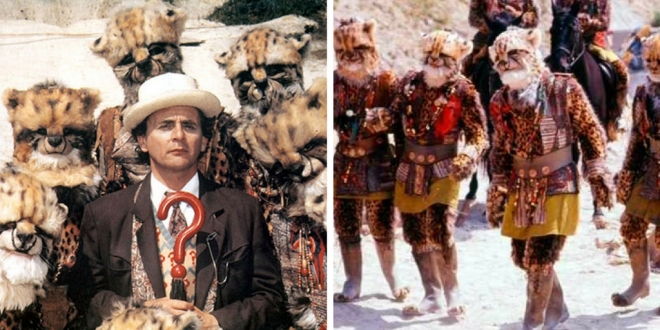
We tell her that we adore Survival, and that a lot of the fan base see it for how great it is now. “I love the fact that Survival has been re-evaluated, for Rona’s sake. She must have been one of the only female writers at that time.” We discuss Jane Baker (Of the Pip and Jane pairing) who had written for the show, but that Rona was indeed one of the first women to write a Who story by herself, with only a handful of women having written for it since. “When I met Rona for the first time and told her that I had been in Survival she asked, ‘were you eaten by a cheetah?’ I said, ‘I was the cheetah!’” Rona and Lisa would go on to hang out at the Gallifrey One convention earlier this year, which we’ll touch more on later.
Of course, Lisa then went on to portray Bernice Summerfield in her very own audio series, 20 years ago this year. How does it compare working in audio compared to TV? “I love creating characters. Audio gives you more freedom. It doesn’t matter what you look like, it doesn’t really matter how old you are… Acting, though, is a group sport, it’s like playing. It isn’t called a play for nothing!” When Big finish began, they had no Doctor Who rights and couldn’t get them because the BBC didn’t give out the license. They wanted something Who-related to create stories for fans and plucked Benny straight from the Virgin New Adventures novels. Virgin had just lost the rights to the show because of the release of Doctor Who’s TV Movie and had given Benny her own solo novel range, making her perfect for audio adventures. So what was it like recording the first Bernice audio story? (Oh no it isn’t! By Paul Cornell and adapted for audio by Jacqueline Rayner)
“After my initial audition with the chaps from Big Finish (Jason Haigh-Ellery, Gary Russell and Nick Briggs) I wasn’t too sure what I was in for. I’d been used to BBC Radio drama – and I had a feeling this might just be a few fan boys, in their front room with a Casio Recorder. The first studio they used was in a damp basement in Elephant & Castle – with a single microphone and a man with a DAT machine in the corner – then, of course – the cast turned up, and they were brilliant – including, of course, Mark Gatiss, and there was Nicholas Courtney (The Brigadier) – playing my cat!
I hadn’t particularly high hopes – but it wasn’t until I heard the final product, having been brilliantly edited by Alistair Lock – that I realised how good it was going to be. Needless to say – we moved studios after that! Digital recording was very much in its infancy in those days – but it sounded great. Obviously, the standards have got higher and higher over the years, and I think it’s fair to say, Benny’s fan base has expanded somewhat as well. It was a job I thought would last a couple of weeks, and that was it – I hadn’t even told my then agent I was doing it. I was slightly surprised when I was suddenly ‘launched’ by Big Finish, with a succession of interviews and presentations at conventions… I was suddenly introduced to a new world I never knew existed.”
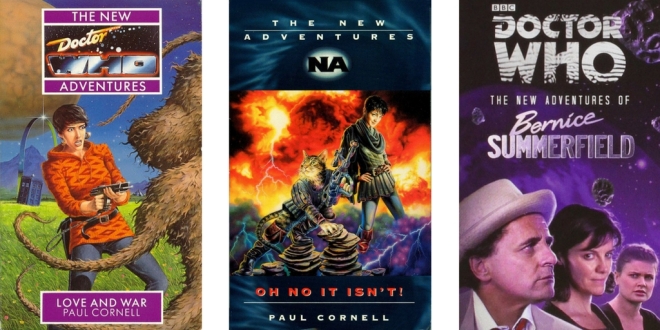
How did Lisa prepare for the role of this iconic character? “I didn’t do my homework” She laughs, “I didn’t read any of the books – mainly because the character was so well drawn in the scripts.” We begin chatting about the transition of the character from the books, and how that was developed. “We must mention Jacqueline Rayner (Doctor Who author) here.” Lisa gushes. “She did such a brilliant job at adapting those books, as she had to take the Doctor out, as Big Finish didn’t have the rights at that time. She had to adapt it to make the character of Bernice central. Not an easy job. The moment you read her you realise she’s fun, clever and funny.” And what is it that she thinks makes the character so popular? “She’s not a superhero, and I think that’s her strength. She’s just a normal human being. She has ‘agency’ – a term I heard recently from Simon Guerrier. When she’s in trouble, she gets herself out of trouble. She’s not stupid, she has knowledge and she’s instinctive, but also – I think she’s quite good company.” We all agree that there is a certain relatability to the character that makes her exciting even without connections to the Who universe.
Bernice has had adventures with the seventh and eighth Doctors as well as unbound universe Doctor, David Warner. She seems to work brilliantly with all of them, and Lisa explains why. “I’ve worked with Sylvester McCoy, Paul McGann and now David Warner, and the character works with every single Doctor! She has a very convincing relationship with every Doctor because she takes every one of them at face value, won’t be afraid to challenge them – but will equally admit when she gets things wrong. She’s not a feminist icon, she’s not an icon, she’s somebody that people can relate to. She’s an ordinary person in extraordinary situations.” An archaeologist from the 26th century, Bernice meets the seventh Doctor and Ace on the planet Heaven, and subsequently began travelling with them in the continued new adventures books until Virgin Publishing lost the license. There’s a very big difference between Benny’s adventures and Doctor Who adventures though. “It’s much more adult, and if she’s in with the Doctor, we have to go back to Doctor Who rules…”
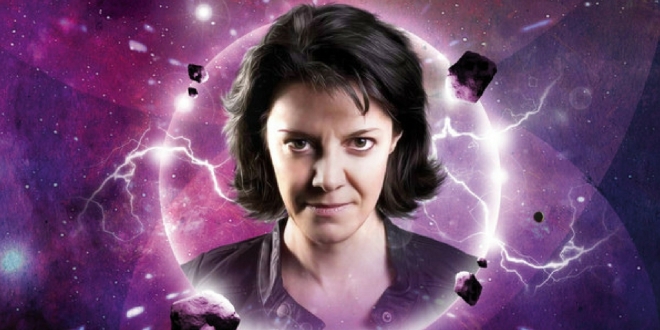
It’s also important to note that Bernice is officially the longest running Doctor Who companion, having adventures and continuous stories since 1992. In fact, in terms of audio dramas, she’s the longest running continual lead in an audio, ever! “And she’s never even been on television!” Lisa says, exasperated. “Sometimes I feel like, I’ve got the invitation but never quite get invited to the party. You get celebrations and anniversaries of the show, and she’s never mentioned! She wasn’t even mentioned in Night of The Doctor.” She did, however, make an appearance in official Twelfth Doctor Book The Big Bang Generation (2015). “I said to Gary (Russell, author of the book), ‘Oh it’s only because you couldn’t use River Song’, and he said ‘no, I’ve included Benny at Steven Moffat’s request!’ I always wish I’d had the balls to go up to Steven and say ‘I dare you. Put her in one episode, just one episode!” It does seem a shame that she hasn’t been seen on-screen and appreciated by the wider fan base, even though she’s been canonised officially on page.
The character definitely has similarities with on-screen character River Song, who also happens to be an archaeologist with a diary. “When River turned up, Steven Moffat did admit to a very big Benny fan at a convention recently that Benny was the inspiration. But I always say they diverge hugely as characters. Other than archaeology, and the diary, there’s nothing to compare the two characters at all.” Her tone changes again to exasperated but light hearted. “When she first turned up I was quietly seething in my armchair. ‘I’ve been slogging my guts out for years you could have at least…’ But then it became obvious that it was a very, very different character indeed.” We divulge that we’re not huge River Song fans, but that the character is loved by many. But what is it then, that makes Benny and her story maintain such longevity? “We’ve had 20 years to flesh her out. Paul Cornell created such a great character, which means she can live on for so long.”
Benny’s adventures were Big Finish’s first audio outing, and proved that there was still a huge market for Doctor Who and it’s spin offs. “Big Finish did prove that there was still a market, an appetite, a huge appetite. I went to Gallifrey One in 1999, when it was 250 people attending. Now look at it!”
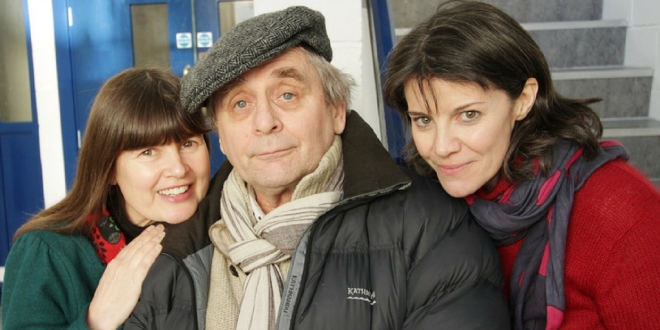
Lisa tells us the story of where she was when the show came back. “When it came back in 2005, my partner and I happened to be at Heathrow and they had put it up on the flight arrivals board! When other new series have started, they’ve even lit up the London Eye blue and I thought how the hell did this happen? I was against Coronation Street 16 years ago and now this, what’s going on?!” A truly phenomenal time then for fans of the classic series and the audio books, who so desperately wanted the show to return. And it’s a good job it did, or we wouldn’t even be here conducting this interview!
“Rose was like yesterday.” Lisa mutters in shock. “What I have noticed about fandom now is that there are more girls. When I went to conventions 12 years ago, you’d find 3 middle aged women and that was it.” And, as we’ve proved on The Time Ladies, there are hundreds of female who fans out there. Why does she think this is nowadays? “You could argue that when there’s a younger Doctor it changes the dynamic they have with the companions, which I’ve always been cautious about. The ‘will-they-won’t-they’ changes the relationship between them, and the responsibility of the Doctor to be the moral guardian. It muddies the pool a bit. I personally, as a child never felt any attraction towards the Doctor.” She laughs heartily. “There was an eccentricity to all the Doctors in those days. So you could argue that, in changing that- it was an interesting move, and brought in more female Doctor Who fans. The end game of that though is that because there are more female Doctor Who fans, it opens the door to a lot more options, which is what we’ve got now.”
And, as we finish up the interview, there is one last thing that Lisa wants to touch on. The subject being America’s biggest Doctor Who convention: Gallifrey One’s ‘Gallifrey Waits No More’ all female panel which took place in February 2018. “I was at Gallifrey One and as you probably know, there was a panel which turned into a sort of ‘Me Too’ confessional.” ‘Me Too’ is a global movement fighting against sexual harassment and assault, encouraging victims to tell their stories with the hashtag #MeToo. Various female Doctor Who alumni, on stage – recounted their own experiences of sexual harassment, and it quickly went viral in the community. So what was the panel originally supposed to be about? “It was meant to be about a female Doctor. ‘Gallifrey waits no more for a female Doctor!’” she explains. “But it very quickly became a panel about something completely different, about women working in the industry. It’s very difficult to comment on because some of the stories were very harrowing, some weren’t so harrowing. I hate this word ‘empower’ because it’s not very helpful.” She goes on. “You should just be yourself and do your job without having to play a game of being powerful. I was very conscious that the stories that had come out on the internet didn’t really convey the fact that none of these stories related to anything that anyone had experienced on the Doctor Who set or in the Doctor Who world.” Which is, indeed a very important point. Nobody on stage had experienced sexual harassment or abuse on the Doctor Who set, which is an incredible testament to the show and its morals, and something we’re very happy to report.
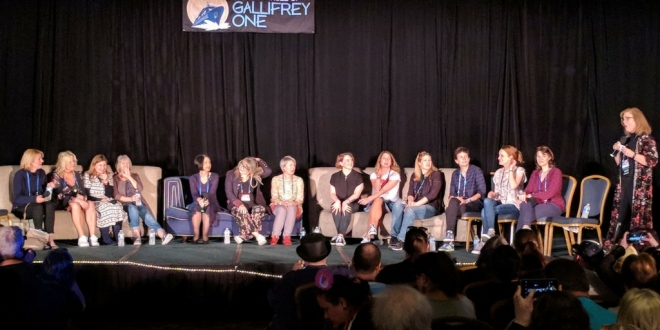
So what are Lisa’s thoughts on the Me Too movement? “I haven’t experienced anything personally to be able to say ‘Me Too’. There are certainly many different interpretations and levels of offence. but as the quote says– ‘the past is a foreign country , they do things differently there’ – and certainly in terms of historic cases – though it’s not justification – people just took some of the behaviour as the norm. It depends on how easily you are offended, and what level the ‘offence’. In terms of equal opportunity for actresses though – as I said earlier on in the panel, Doctor Who and science fiction have served female characters well over the years. I think if you’re going to be an actress in any genre this is the one. In terms of the ‘new’ Doctor – The Doctor, as a character, will always have the same traits, the same moral compass, and isn’t known for throwing his muscles around. So really, It doesn’t matter if it’s a woman or a man playing the character.”
“They’ve always existed: Vicki, Liz Shaw, Sarah Jane.” She goes on to add. “They’re all strong female characters. You could argue against some of them, but they are there. They weren’t always just screaming girls. I don’t think Bonnie [Langford] was very well served, but it got better with Ace.” It’s always hard to examine characters from such a long time ago, mostly because they are products of their time. In some ways, Doctor Who was always ahead of the game with its women, but not always. “I can’t stand when things are too politicised. It alienates people. It’s important to have well written drama that isn’t too polemic – or there’s an inevitable backlash. You’re never going to convert anyone by bashing them over the head with ‘messages’. Intelligent, well written, relatable drama, is the key. There were a lot of comments in the panel saying ‘isn’t it a pity that we haven’t got… And I was thinking, ‘well actually you are talking about Ace’, I wanted to bring up Liz Shaw, Sarah Jane, Leela and Romana – even Benny. Again, I have a slight issue with the words ‘strong woman’. Why don’t you just call them women – or just… people? You get weak women, you get strong women. You get weak men, you get strong men. It’s an individual thing. If they’re a well written, observed and truthful character, that’s the bottom line.”
Doctor Who has now significantly stepped up its game in terms of equality, and have finally cast a female Doctor. There’s been some backlash though, with lots of people saying the role should stay male. What are her thoughts on this? “Change is always a challenge. They did the same to Matt Smith and Peter Capaldi. This particular fandom have a sense of ownership and entitlement and you get it with most fandoms. I listened to Matt Smith’s desert island discs and he said he almost turned it down! After he’d said yes, somebody apparently said to him in the street ‘just don’t ruin it’. Everything creative is subjective, you can’t please all people all the time. You can’t play to a demographic, otherwise you end up with an end product that’s very bland. In terms of the Doctor being a woman – well – why not? As I said earlier – the Doctor’s essential character won’t change – and I think, as with most Doctors in the past – she’ll just be reflecting the spirit of her age.” Doctor Who has always been one to take risks, and probably wouldn’t have lasted over 50 years without doing so.

Going back to the Gallifrey One panel, Lisa says, “They were talking about the Bechdel test saying, ‘isn’t it a pity we don’t have a character like this…’ and making a list of traits. Ironically, James Goss had written a recent article talking about how many points of the test Benny as a character had passed. I had to put my hand up and say ‘she does exist, and I’ve been playing her for the last 20 years and GUESS WHAT? She was created by a man!” It’s clear to see that Lisa is massively passionate about Bernice, her legacy and how she fits in with the rest of Doctor Who. With 2018 being her 20th anniversary year of audios with Big Finish, is there anything she wants to add? “I’m now past my mid 50s and thank god for audio, because there’s not much else of interest on offer unfortunately after a certain age. It’s been proven that Bernice can survive away from the Doctor Who world, and she’s stayed around since. Big Finish have always stuck with Bernice Summerfield, and I’m so grateful that they have.”
With a call to the studio, Lisa is whisked away by the Big Finish team, ready to carry on her many adventures in space and time. Here’s to another 20 years, Benny.
We recently partnered with Big Finish to launch a competition for a new Bernice Summerfield writer! The winner will have their short story read by Lisa Bowerman as part of the Bernice Summerfield short stories anthology, In Time. Keep your eyes peeled on our social media channels for the winner announcement.

Brilliant stuff! I had genuinely never realised she was a Cheetah. That story was impressed so hard in my memory. Cheers!
LikeLike
Excellent interview! But I’m surprised the interviewer didn’t even bring up Lisa Barrowman’s directing for Big Finish. She’s directed several of the Doctor Who Companion Chronicles and even one of the HG Wells adaptations. I’d love to read an interview about her directing experiences! But thanks for this article and this is a great space!
LikeLike